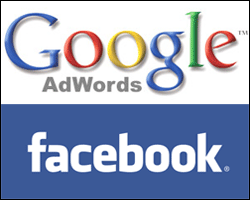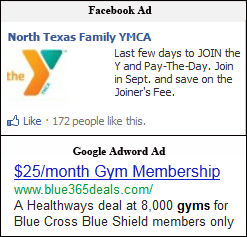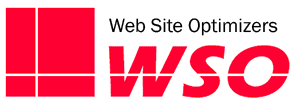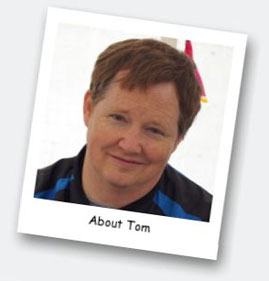 We’re talking online advertising today, and historically, that conversation has always started with pay per click (PPC) ads, and the dominant player in that game: Google AdWords. However, with nearly a billion users, Facebook has emerged as a viable alternative to search marketing for many.
We’re talking online advertising today, and historically, that conversation has always started with pay per click (PPC) ads, and the dominant player in that game: Google AdWords. However, with nearly a billion users, Facebook has emerged as a viable alternative to search marketing for many.
The advertising platforms for Google and Facebook are very different. So which is best for you? Most likely, you’re reading this either because you’ve done no online advertising in the past but are considering it now, or you have advertised to some degree (probably with AdWords) and are wondering if it is time for you to expand your reach with a second platform. So is one of these platforms better for you than the other? Does it make sense to utilize both? Let’s explore!
Note: Obviously, there are other search engine PPC platforms besides Google, most notably Bing/Yahoo!. And of course, there are other content-based ad platforms in addition to Facebook, such as LinkedIn and Google itself. And while I’ll touch briefly on Google Display Network vs. Facebook a little later, I’m sticking mainly to comparing Facebook Ads vs. Google AdWords in the search environment since they are the dominant players in those respective fields.
Targeting
The whole concept of advertising is about getting your message in front of the people who you value most. Facebook Ads and Google AdWords have different ways of doing this. AdWords ads are shown to people searching for things similar to what is being advertised. If you sell shoes, you opt to have your ad shown for people searching on “shoes” or “footwear” or perhaps “running equipment” (if you in fact offer running shoes). The idea is that your ad is being shown to people who have a direct interest at that very moment in what you’re promoting. That’s pretty valuable stuff. If you’re selling a product, there’s probably no visit you’d value more than the one from someone who is looking to purchase a product like yours.
The Facebook method of targeting your ad is a little different. It’s based on demographics and other information that Facebook knows about its users. With Facebook Ads, you can instruct to have your ad shown to anyone who meets very specific criteria on things like gender, age, location, relationship status, education, career, interests, and more. You can even show your ad only to people on their birthdays. Facebook can do this because they have all this information about their users. Google can do geographic targeting, and can attempt to do some additional demographic targeting by using information from Google+, but with about one-tenth as many users as Facebook, such targeting is probably not that effective for AdWords.
Ad Content

Samples of Facebook and AdWords ads
Both platforms give the advertiser a pretty free rein in what text will appear in the ads. Both limit the amount of text you can display, but you can display more in Facebook ads. And you can display “richer” content in Facebook ads with graphics and even video. Google does have some routes for displaying an image in an ad, but those opportunities are limited for its search engine ads.
Additionally, Google’s unpredictable Quality Score can take a seemingly relevant ad and relegate it to the bench for not being relevant enough to the landing page. (How many times have you seen the same ad have an acceptable Quality Score for “green widgets”, but unacceptable for “green widget”?) This can force you to tweak the content of your ads until they rank better. Facebook Ads definitely allow you to include more “eye candy” to entice a click than most AdWords ads in Google’s search engine.
Google’s Display Network Ads do allow much more flexibility not only in terms of graphics, but also in terms of size. I’m not comparing Google’s Display Network to Facebook in this post (perhaps a future blog post). Even Google’s Display Network is “subject based” rather than “reader based”, and targeting specific subjects gets the best results with regular old AdWords.
Costs
On Facebook, you can opt to pay on a per-click basis (as with AdWords), or on a CPM basis where you pay per thousand impressions. If you are only interested in exposure and not clicks, then a CPM method can be a very affordable method of online advertising. If it is clicks you are after, in general the cost per click on Google will be significantly higher than on Facebook, and this makes sense. Again, more often a person clicking on an AdWords ad is in a more advanced state of ready to purchase than one clicking on a Facebook ad.
Your Objectives
Here is really where the rubber hits the road. I can make a good argument for either platform if I don’t know what your objectives are. But advertising is just one component of an overall Marketing Plan, and it must integrate with all the components to help achieve your desired marketing objectives. So what are your objectives for these ads? Are you trying to drive traffic to your site in hopes of them placing an order? Are you trying to increase your brand awareness? Are you hoping to generate leads? Are you trying to build customer loyalty? Without knowing what your objectives for your campaign are, you can’t determine if either platform will be successful for you.
If you are trying to drive traffic to your site in hopes of making a conversion (an online order, a completed lead form, signing up for a newsletter, a phone call, etc.), then there is probably no better online advertising choice than Google AdWords. It will send pre-qualified visitors to your site who are ready to make a purchase right now. It will send visitors to your site who are not ready to buy yet too, but many of those can turn into a buyer at a later date. The important thing is that there are very few methods of generating traffic that is more prequalified than Google AdWords.
However, if your objectives are less immediate, then Facebook can start to become a better option. If you are trying to build brand awareness, generate more word-of-mouth activity, or build customer loyalty, then immediate traffic might not be your first priority. You want to get your message in front of people who are your most likely target segments. You want to engage them in online activity with their friends. You can utilize Facebook’s advanced targeting to communicate directly to those who you value the most. You can entice more Facebook users to “Like” you. You can leverage the social nature of the network when people forward your message to their friends. And you can usually do this at a lower cost than an AdWords campaign would cost.
So Who Is Best?
Again, it depends on your objectives (if you didn’t read the three paragraphs above, go back and do it!). Ideally, I generally think that both can play a valuable role in a complete and integrated marketing plan. But in the end, you must assess what you are trying to achieve, balance that with the budget available, and determine what you can execute most effectively.







